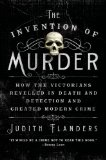Summary | Excerpt | Reviews | Beyond the Book | Readalikes | Genres & Themes | Author Bio

How the Victorians Revelled in Death and Detection and Created Modern Crime
by Judith Flanders
The answer was that this 'honourable profession' was shrouded in mystery, and what people did know of it, they despised, the prevailing mental image being not a law-enforcer, but more a law-breaker: the eighteenth-century thief-taker, the criminal turncoat. That was about to change, partly through the publication of the memoirs of the French detective Eugène Vidocq (1775–1857). Vidocq had started his career as a not terribly successful criminal. After a number of convictions, he became a police spy, or informer, working secretly for the government while still in prison. In 1811 he was one of four ex-convicts to be made a detective, and in 1812 he became the head of the newly created Brigade de Sûreté, with thirty men under his command. None of this would have been of more than passing interest in Britain, had it not been for his Mémoires, which in translation swiftly became a best-seller.
It is almost certain that Vidocq did not write his own Memoirs. Nor can they truly be called biography. The last two volumes borrow wildly from a variety of sources, including a short story previously published by one of his ghost writers, while entire passages are blatantly lifted from The Police of London, a work of policy reform by Patrick Colquhoun, with French place names substituted for Colquhoun's original English ones. Nonetheless, the Memoirs were brilliant PR, with Vidocq transformed from an old-style thief-taker to a sympathetic outlaw, and then to a new thing altogether – both in literature and in life – a detective, although what he described barely resembled what was later to be known as detection (and it would be another twenty years before the word itself was invented). For the moment, Vidocq merely intensified the spy system of the Revolution, keeping extensive records on known criminals and paying informants. Mostly in the Memoirs he disguises himself and hangs about in low haunts in order to overhear criminals plotting, or just bribes someone to tell him about a planned crime, which he then foils.
Vidocq's Memoirs found a ready audience, and, more importantly for popular recognition, in 1829 they were adapted in two theatrical versions: at the Coburg Theatre, as Vidocq, the French Police Spy, by J.B. Buckstone; and, just down the road from the Coburg, at the Surrey, in Douglas Jerrold's rival version, with only an exclamation point's difference: Vidocq! the French Police Spy. That year the words 'police spy' had particular resonance, as Home Secretary Sir Robert Peel finally managed to finesse through Parliament the Act that created the Metropolitan Police, replacing the old parish watch system and creating what has been called the first professional police force.*
Three decades earlier, Colquhoun had written, 'Police in this country may be considered as a new science, the properties of which consist not in the Judicial Powers which lead to Punishment, and which belong to the magistrates alone, but in the Prevention and Detection of crimes…' This, today so routine, was groundbreaking, in a single sentence setting policing on an entirely new track: that it was a professional job; that it and the legal system were two different arenas; and that it should be preventative, acting prior to the commission of criminal acts. John Fielding, a remarkable magistrate, had, it is true, begun to move towards detection when he set up a 'Register of Robberies, Informations, Examinations, Convictions, suspicious Book [sic], and Newgate Calendars' – that is, not a register of crimes only, but of potential criminals and potential crime. But for the most part, prosecution after the commission of a crime was all that was expected. This had been fairly efficient in rural communities and towns, where populations were small and people all knew each other. In rapidly urbanizing areas, however, crime detection was more difficult, and the number of cases that came before the magistrates put them under enormous pressure.
From Invention of Murder by Judith Flanders. Copyright © 2013 by the author and reprinted by permission of St. Martin's Press, LLC
Your guide toexceptional books
BookBrowse seeks out and recommends the best in contemporary fiction and nonfiction—books that not only engage and entertain but also deepen our understanding of ourselves and the world around us.